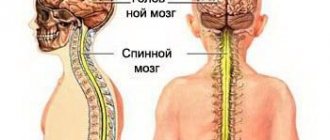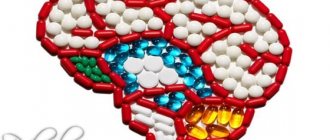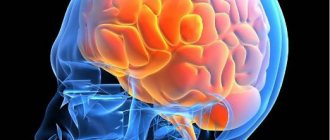Everyone knows that alcohol is dangerous and can lead to the death of a person, but this does not reduce its consumption. According to statistics, the heaviest drinking people in the world are Europeans - about 10% of the European population suffer from alcohol addiction.
Every year, about 2.5 million people die due to causes related to drinking alcohol.
The consumption of alcohol-containing drinks affects the entire body, and the diseases that the drinker develops are aggravated. There is an opinion among people that the liver suffers the most from alcohol, and regardless of the quality of the alcohol - whether it is an expensive drink or a surrogate, the greatest damage is done to the brain, and all changes that occur to it are irreversible. Let's try to figure out what happens to the brain after ethanol enters the body.
Blood as a conductor of ethanol to the brain
The effect of alcohol on the human brain can be noticed literally from the first minutes after drinking the drink - first the mood improves, then speech becomes confused, all reactions slow down. Changes in behavior can be noticed after drinking a small amount of alcoholic beverages, however, once the alcohol stops, the condition returns to normal over time. But if alcoholic beverages are consumed regularly and in large quantities, the harmful effects on the brain do not stop even after the last drink.
The effect of alcohol on the brain depends on a number of factors:
- quantity and frequency of drinking strong drinks;
- the age at which a person started drinking and the “experience” of alcoholism;
- gender and genetic predisposition to alcoholism;
- prenatal ethanol poisoning;
- presence of chronic diseases.
Ethanol, after entering the body, is instantly absorbed into the blood and, along with the bloodstream, immediately enters the brain, where it begins its destructive effect.
The brain “gets drunk” more than other organs: if the amount drunk is taken as one, then its concentration in the liver will be 1.45, in the spinal cord - 1.5, and in the brain - 1.75.
Any dose of alcohol thins the blood, thus leading to erythrocyte motility and, as a consequence, a decrease in blood clotting. If alcohol is consumed regularly, the body becomes dehydrated and the blood thickens. In addition, ethanol is a kind of natural solvent. Under its influence, the membranes of red blood cells dissolve, and the blood cells themselves stick together, forming blood clots. They partially clog blood vessels, resulting in hypoxia of brain tissue. The result is euphoria and impaired logical thinking. Thrombosis can also lead to blockage of blood vessels in the heart or brain, which increases the likelihood of heart attack and stroke.
Is it possible to drink if you have certain diseases?
The presence of illness makes its own adjustments to the nuances of drinking alcohol. Different types of alcoholic beverages can be beneficial or harmful for various pathologies, ailments, and diseases of the blood vessels and brain.
- After the concussion . A concussion is a mechanical action, a kind of bruise that has an effect similar to alcohol intoxication (poisoning). A concussion is accompanied by changes in blood pressure, dizziness, loss of coordination and even orientation, nausea, and vomiting. Therefore, you should not add stress after a concussion with alcohol. Violation of this rule can lead to increased headaches, hypertensive crisis, vasospasm and cerebral edema, stroke, and coma. How much exactly should you not drink? Until complete recovery.
- For a stroke . Good red wine and cognac, consumed in small doses, really cleanse and strengthen blood vessels, and also prevent atherosclerosis and stroke. However, immediately after the occurrence of a stroke, in no case should you aggravate the condition, which is characterized by loss of consciousness, hemorrhage, sometimes paralysis, etc.
- For atherosclerosis . A small and periodically taken dose of high-quality alcohol helps reduce the level of “harmful” cholesterol and stimulates the production of “good” cholesterol in the liver, dissolves fatty deposits on the walls of blood vessels, cleanses the blood and improves blood circulation. Exceeding the recommended dose leads to the opposite effect.
- With hypoxia . Brain hypoxia occurs at the first signs of intoxication, the degree of which dictates the amount of harm from hypoxia. Alcohol is the direct culprit of oxygen starvation. However, in the hangover stage, a minimal dose of ethanol can save you from a stroke.
- With a cyst . This is a benign neoplasm. But it can lead to disruption of some parts of the brain. Therefore, the cyst should not be disturbed. That is, any negative processes are dangerous: the slightest increase in pressure, blood thickening, etc. Alcohol is not advisable until the disease is cured.
- With a tumor . Oncology is a mysterious disease. Despite the fact that some alcoholic drinks have an anti-cancer effect, as they contain a large amount of antioxidants, you should not provoke an existing disease by placing additional stress on the diseased organ. Moreover, even a healthy drink cannot be the decisive factor in the cure.
The mechanism of alcohol's effect on the brain
The effect of alcohol on the brain is multifaceted due to its very complex structure. The organ consists of five sections that communicate with each other thanks to billions of neurons - nerve cells. To protect against the effects of toxic substances, viral and bacterial infections, there is a natural barrier between it and the circulatory system, but it does not work in the case of alcohol, which, due to its solvent function, has the ability to penetrate cell membranes.
Getting into the brain with blood, ethanol contributes to pathological changes in its cell membranes. Thrombosis caused by alcoholic beverages causes the death of neurons.
The effects of alcohol on different parts of the brain are individual:
- The cerebellum, which is responsible for coordinating movements and maintaining balance, suffers from ethanol ingestion and loses its functions, which is clearly visible in the staggering gait of an alcoholic.
- The cerebral cortex, which is responsible for thinking, after exposure to alcohol, loses the ability to recognize objects, cannot concentrate on anything, and memory lapses occur. With regular abuse, the patient’s level of intelligence decreases, and with a constant effect, personality degradation begins.
- The medulla oblongata performs one of the most important functions, as it is responsible for breathing, thermoregulation and self-awareness. If cells die in this section, the person becomes drowsy, body temperature decreases, and fainting may occur.
After ethanol breaks down, a person begins to have a hangover, accompanied by headache and thirst. This is easy to explain - the body strives to remove dead neurons. Headache is a consequence of increased intracranial pressure and a rush of fluid, as a result of which dead neurons are released in the urine.
The blood vessels of the head also suffer from alcohol - at the beginning of intoxication, they expand, and then a sharp narrowing, which can cause a stroke, severe disability and even death.
Changes occurring in the structure of the brain can lead to the following irreversible consequences:
- multiple microscopic hemorrhages,
- smoothing of brain convolutions,
- formation of voids,
- volume reduction,
- lack of oxygen in tissues.
Reducing the negative effect
To get rid of the slightest chance of causing irreparable harm to yourself, you should give up drinking completely. If this option is not suitable for you, then with the help of some rules, it will be possible to at least reduce the negative impact on the body.
Remember to drink plenty of fluids. The liquid perfectly removes toxins from the body, which are the breakdown products of alcohol. Ideally, you should drink a liter or even two more than normal if you plan to go to a party.
During the libation, an important stage is the appetizer. On a full stomach, you are unlikely to get drunk quickly; in addition, the body will have the opportunity to gradually eliminate alcohol, since some of it will be absorbed by food.
Despite the need to eat heavily, avoid very fatty foods. Fat can create a film that protects the gastric mucosa from alcohol, but in large quantities it will put an additional burden on the liver, which already has to work with alcohol.
Do not mix alcohol with carbonated drinks. They are full of carbon dioxide, which leads to faster absorption of alcohol. If you just want to support your friends in the company, spread one serving of strong drink over an hour.
Serotonin and alcohol
To exchange information between brain cells, there is a neurotransmitter - serotonin, the level of which determines whether a person will be drawn to drink or not. To put it simply, ethanol intoxicates due to disturbances in the action of serotonin. If the level of the neurotransmitter is elevated, the drunkard is again drawn to drink.
Serotonin levels are affected by both single and long-term alcohol consumption.
If alcohol enters the body for a long time, the brain is rebuilt to “live” in conditions of regular ethanol intake, so a person has a constant desire to drink. And the lower the level of serotonin, the higher it is. Therefore, to treat alcoholism, drugs are often used to normalize serotonin levels, which reduces the craving for ethanol.
Hangover
Brain recovery after alcohol is difficult. A hangover is accompanied by a change in the acid-base balance in the body, as a result of which the blood oxidizes and thickens. Dehydration of the body occurs, tissue hypoxia develops, including the brain. This condition is temporary. Sometimes a person develops depression, anxiety, an epileptic seizure, concentration and memory are impaired. With severe alcohol intoxication, ischemic stroke can develop.
Alcohol and thiamine
In addition to disruptions in the functioning of neurons, alcohol harms the brain due to a lack of thiamine (aneurins) - vitamin B1. If the body feels a lack of it, then the person wants to drink alcohol. Lack of B1 occurs due to metabolic disorders due to changes in the gastrointestinal tract - thiamine is not absorbed from the intestines.
Aneurin less than 1.2 mg. The body of alcoholics experiences an acute lack of thiamine, which provokes the development of Wernicke-Korsakoff syndrome, that is, encephalopathy and psychosis. People with this pathology have impaired coordination, clouding of consciousness and optic nerve paralysis.
The danger of thiamine deficiency is that all the negative effects of alcohol on the brain are irreversible, therefore organic lesions can no longer be cured. Therapy in this case is aimed largely not at normalizing the patient’s condition, but at providing him with quality care. About 25% of alcoholics with this diagnosis cannot live normally without qualified medical care.
Ethanol and brain diseases
It is very important to understand what happens to the brain if an alcoholic has a history of diseases of the nervous system, and these pathologies can manifest themselves as a result of alcohol addiction.
Encephalopathy
Diseases of the nervous system often develop and progress due to poisoning from intoxicating drinks and the impurities they contain. This is explained by the death of neurons, as a result of which brain activity is disrupted.
Alcoholism often develops encephalopathy, which is characterized by:
- organic changes in neurons;
- violations of memory processes;
- indifference;
- instability of the emotional sphere.
This disease is considered the last stage of alcohol dependence.
Korsakoff's disease
Sometimes the effect of alcohol on the brain causes the development of Korsakoff's disease. The pathology is characterized by memory impairment, dementia, and polyneuritis. An alcoholic with this diagnosis loses orientation in time and space and cannot solve basic mathematical problems. In parallel with the pathology, the patient experiences muscle wasting and soon becomes disabled.
Alcoholic epilepsy
Symptoms of the pathology occur during a hangover, and if the alcoholic can get rid of his addiction, the symptoms will disappear. Otherwise, drunkenness will worsen, and seizures will recur regularly. Eventually, dementia will begin to progress.
Neurotic disorders
The effects of alcohol on the brain with regular consumption become noticeable very quickly due to the mental disorders of the drinker. He experiences neurotic changes:
- increased fatigue,
- irritability,
- delirium,
- hallucinations,
- paranoia,
- jealousy.
The state of hallucinations and delirium tremens requires urgent hospitalization.
Recovery after long-term use
Visually, the brain of a healthy person differs from this organ of an alcoholic, which is confirmed by the results obtained from studying this organ using MRI. In this case, the damaged nerve tissue appears as a darkening in the resulting image.
The success of restoring the brain of a former alcoholic depends on the degree of destruction of its structures and the desire of the patient, since no one can force a person to follow all the necessary recommendations of doctors.
Of course, it will not be possible to completely restore all lost nerve cells in the brain after drinking alcohol, but recent studies indicate that abstaining from drinking alcoholic beverages can lead to a partial restoration of the organ’s functioning. This is confirmed by the fact that after just one year of sober life, the patient’s brain volume begins to increase, intelligence and the ability to think broadly begin to recover.
At the same time, drug treatment of a former alcoholic should be carried out only in a hospital setting, under the supervision of a number of specialists: psychiatrists, narcologists and general practitioners, since long-term alcohol intake affects all body systems. In each case, treatment tactics are selected individually.
We suggest you read: Is it possible to drink alcohol on a plane from duty free?
Typically, such treatment involves intravenous administration of medications aimed at cleansing the blood of toxins, taking nootropics - substances that improve blood circulation in the brain, and a complex of vitamins.
If the patient has cerebral edema, then he is prescribed diuretics, for example, Furasemide or Diacarb.
The patient's speedy recovery is facilitated by the normalization of the diet, since gastritis and gastric ulcers are a frequent accompaniment of alcoholism.
In the future, after the therapy, the patient must definitely visit a narcologist and psychotherapist for several years, and often the psychological responsibility for his rehabilitation often falls on the furnaces of relatives, who are obliged to pay as much attention to the sick person as possible.
The answer to the question of whether you should drink alcohol after therapy is clear - of course not! Indeed, in this case, all treatment will go down the drain, and the destruction of brain structures will begin to progress with a vengeance. After all, any sober-minded person does not have a question about whether it is possible to drink alcohol with a concussion.
During a hangover, the nervous system is characterized by irritability, anxiety and lack of mood. Therefore, the first thing people should do after drinking alcohol is to get a good night's sleep. Valerian, motherwort, Grandaxin, Glycine, Picamilon, Mexidol and Novo-passit will help reduce irritability and aggression.
How alcohol kills brain cells Animation. Zhdanov
In order to never encounter the consequences of alcohol on the human nervous system, you should initially stop drinking it and keep your own health and nerves in order.
Is the functioning of the thinking organ restored after quitting alcohol and how long does it take? In recent decades, medical scientists have argued that brain cells and neurons are capable of recovery, since their gradual death is a natural process.
The only problem is that in alcoholics, the rate of destruction of neurons significantly exceeds the rate of their rebirth. And the process of their restoration after long-term use takes quite a long time: years, and sometimes decades, but still does not lead to the absolutely desired result.
To return the thinking organ to an adequate state, a number of conditions must be met:
- Stop drinking alcohol 100% for at least a year, or better yet, for good.
- Undergo detoxification with the help of medications, as well as follow a special diet that will help cleanse the blood vessels.
- Lead a healthy lifestyle that is beneficial for blood vessels: follow an appropriate diet, lead an active lifestyle.
- Engage in prevention and replenish losses: take vitamin-mineral complexes, antioxidants, etc.
But even if you follow these rules, you cannot accurately answer how long it will take for all mental functions to be restored.
Harm of ethanol depending on gender
It is believed that alcohol destroys a woman's brain much faster than a man's brain. The consequences of taking ethanol for a girl are always more severe than for a guy, because the weaker sex develops liver cirrhosis and cardiomyopathy faster.
In the case of the brain, expert opinions differ. Thus, the majority believes that the process of neuronal death in women begins with the same dose of ethanol as in men, and occurs at the same speed, the main factor is the ratio of the woman’s weight and alcohol standards, respectively, the higher the dose for low body weight , the sooner all violations develop.
However, there are still differences: alcohol destroys both gamma-aminobutyric acid receptors in men, while in women only one receptor is affected. In addition, the electrical activity of the brain in the stronger sex decreases much faster with regular drinking than in women.
Recent studies have shown that the restoration of brain structures in men occurs faster than in the weaker sex, which probably explains that male alcoholism is treated better than female alcoholism.
Alcohol and pregnancy
Every year, more and more research is conducted into how alcohol affects the fetal brain. Drinking alcohol during pregnancy, a woman causes irreparable harm to the baby, since ethanol entering his bloodstream interferes with normal cell division, which affects the neurons of the brain and spinal cord the most. To assess the harm that a child receives prenatally, in medicine there is the term “fetal alcohol spectrum disorder,” and these disorders can manifest themselves both immediately after birth and throughout life.
Alcohol, entering the fetal brain, disrupts the functioning of the department responsible for the physical and mental development of the child - such children do not gain weight well and may be short in stature. In addition, they are often diagnosed with affective behavior, hyperactivity, mental retardation, and impaired hand-eye coordination. Moreover, the severity of the disorders largely depends on the amount and frequency of alcohol consumption by the mother.
If a pregnant woman abused alcohol, but told the doctor about it in a timely manner, then in 80% of cases the unborn baby can be helped and possible pathologies can be avoided.
Interesting video
Now we invite you to watch the video:
People have been drinking alcohol for centuries. With knowledge of its properties and skillful use, some brain diseases can be prevented. But you can also harm it if you do not know the measures and principles of influence on the body. Thoughtless and excessive use can completely destroy this fragile but important organ.










